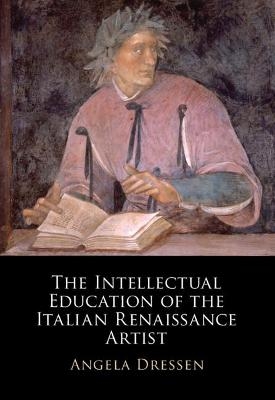
The Intellectual Education of the Italian Renaissance Artist
Seiten
2021
Cambridge University Press (Verlag)
978-1-108-83132-1 (ISBN)
Cambridge University Press (Verlag)
978-1-108-83132-1 (ISBN)
This book provides an overview of the history of education in the Renaissance, looks where the artist fits into it, and provides specific examples for artists and texts they used. It will appeal to scholars and advanced students of early modern Italian art, intellectual, cultural ,and social history.
Scholars have traditionally viewed the Italian Renaissance artist as a gifted, but poorly educated craftsman whose complex and demanding works were created with the assistance of a more educated advisor. These assumptions are, in part, based on research that has focused primarily on the artist's social rank and workshop training. In this volume, Angela Dressen explores the range of educational opportunities that were available to the Italian Renaissance artist. Considering artistic formation within the history of education, Dressen focuses on the training of highly skilled, average artists, revealing a general level of learning that was much more substantial than has been assumed. She emphasizes the role of mediators who had a particular interest in augmenting artists' knowledge, and highlights how artists used Latin and vernacular texts to gain additional knowledge that they avidly sought. Dressen's volume brings new insights into a topic at the intersection of early modern intellectual, educational, and art history.
Scholars have traditionally viewed the Italian Renaissance artist as a gifted, but poorly educated craftsman whose complex and demanding works were created with the assistance of a more educated advisor. These assumptions are, in part, based on research that has focused primarily on the artist's social rank and workshop training. In this volume, Angela Dressen explores the range of educational opportunities that were available to the Italian Renaissance artist. Considering artistic formation within the history of education, Dressen focuses on the training of highly skilled, average artists, revealing a general level of learning that was much more substantial than has been assumed. She emphasizes the role of mediators who had a particular interest in augmenting artists' knowledge, and highlights how artists used Latin and vernacular texts to gain additional knowledge that they avidly sought. Dressen's volume brings new insights into a topic at the intersection of early modern intellectual, educational, and art history.
Angela Dressen is the Andrew W. Mellon Librarian at I Tatti – The Harvard University Center for Renaissance Studies in Florence, Italy. She is the author of Pavimenti decorati del Quattrocento in Italia, and The Library of the Badia Fiesolana: Intellectual History and Education under the Medici.
1. Mechanical arts versus liberal arts and recommendations for the artist's education; 2. Educational places and opportunities; 3. The meditating texts; 4. Vitruvius and Pliny as sourcebooks, educational landmarks and intellectual challenge; Conclusion.
| Erscheinungsdatum | 06.09.2021 |
|---|---|
| Zusatzinfo | Worked examples or Exercises |
| Verlagsort | Cambridge |
| Sprache | englisch |
| Maße | 182 x 259 mm |
| Gewicht | 980 g |
| Themenwelt | Kunst / Musik / Theater ► Kunstgeschichte / Kunststile |
| Geisteswissenschaften ► Geschichte ► Regional- / Ländergeschichte | |
| Geschichte ► Teilgebiete der Geschichte ► Kulturgeschichte | |
| Sozialwissenschaften | |
| ISBN-10 | 1-108-83132-X / 110883132X |
| ISBN-13 | 978-1-108-83132-1 / 9781108831321 |
| Zustand | Neuware |
| Informationen gemäß Produktsicherheitsverordnung (GPSR) | |
| Haben Sie eine Frage zum Produkt? |
Mehr entdecken
aus dem Bereich
aus dem Bereich
der stille Abschied vom bäuerlichen Leben in Deutschland
Buch | Hardcover (2023)
C.H.Beck (Verlag)
23,00 €
Die Revolution des Gemeinen Mannes
Buch | Softcover (2024)
C.H.Beck (Verlag)
12,00 €


